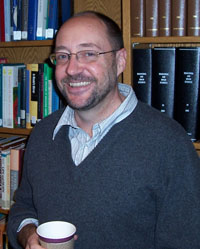Peter Ludlow | |
|---|---|
 Ludlow in 2005 | |
| Born | January 16, 1957 |
| Era | Contemporary philosophy |
| Region | Western philosophy |
| School | Analytic philosophy |
| Institutions | |
| Doctoral advisor | Charles Parsons |
Main interests | Philosophy of language, philosophy of linguistics, epistemology, conceptual issues in virtual worlds |
Notable ideas | Implicit comparison classes, the dynamic lexicon, externalism about logical form, Ψ-language, tensism, microlanguages |
Peter Ludlow (/ˈlʌdloʊ/; born January 16, 1957), who also writes under the pseudonyms Urizenus Sklar and EJ Spode, is an American philosopher. He is noted for interdisciplinary work on the interface of linguistics and philosophy—in particular on the philosophical foundations of Noam Chomsky's theory of generative linguistics and on the foundations of the theory of meaning in linguistic semantics. He has worked on the application of analytic philosophy of language to topics in epistemology, metaphysics, and logic, among other areas.
Ludlow has also established a research program outside of philosophy and linguistics. Here, his research areas include conceptual issues in cyberspace, particularly questions about cyber-rights and the emergence of laws and governance structures in and for virtual communities, including online games, and as such he is also noted for influential contributions to legal informatics. In recent years Ludlow has written nonacademic essays on hacktivist culture and related phenomena such as WikiLeaks and the conceptual limits of blockchain technologies.
Ludlow has also written literature and poetry under various pseudonyms, most frequently under the name EJ Spode, which he has used to experiment with various forms of dialect prose and poetry and a genre a literature that he has called Hysterical Surrealism.[1]
Ludlow has taught as a professor of philosophy at the State University of New York at Stony Brook, the University of Michigan, the University of Toronto and Northwestern University, where he was the John Evans Professor in Moral and Intellectual Philosophy.[2] In May 2015, Ludlow resigned his position at Northwestern after a university disciplinary body found that "he had engaged in sexual harassment involving two students."[3][4] The charges and their aftermath generated controversy and led to a book by the feminist author Laura Kipnis, who defended Ludlow.
- ^ "Hysterical Surrealism". creatrixmag.com/redtemple.
- ^ "Ludlow Named John Evans Professor in Philosophy: Northwestern University News". Archived from the original on 2019-07-04. Retrieved 2016-07-17.
- ^ "Statement by Alan K. Cubbage, Vice President for University Relations, in Regard to Peter Ludlow". news.northwestern.edu.
- ^ Cite error: The named reference
McCarthywas invoked but never defined (see the help page).